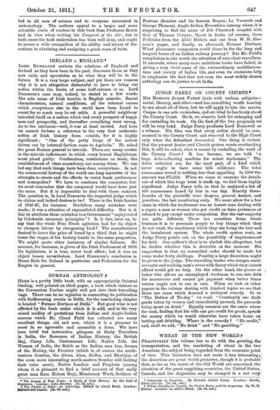IRELAND v. ENG-LAND.*
LORD DUNRAVEN reviews the relations of England and Ireland as they have been in the past, discusses them as they now exist, and speculates as to what they will be in the future. It is a very large subject, and yet there are reasons why it is not altogether distasteful to have to bring our notice within the limits of some half-column or so. Lord Dunraven's case may, indeed, be stated in a few words. The sole cause of Irish trouble is English misrule. Racial characteristics, natural conditions, all the internal causes which everywhere else in the world have been found to count for so much may be set aside. A powerful neighbour intruded itself on a nation which had every prospeot of happi- ness and prosperity, and thereafter everything went wrong. As to the intrusion–awell, it was at least invited. And here we oannot forbear a reference to the very first authentic notice of Irish history from outside, for it is highly significant : " One of the petty kings of the nation driven out by internal faction. came to Agricola." He asked the great Roman general to intrude. There are many counts in the misrule indictment to which every honest Englishman must 'plead guilty. Confiscation, restrictions on trade, the establishment of, class ascendency, are among them. We can but say that such things have been done, everywhere. Is not the commercial history of the world one long .narrative of the attempts to create and the efforts to resist trade preferences and monopolies P We have to condemn the conqueror, but we must remember that the conquered would have done just the same. But it is impossible to deal with these matters. The question is, Is Lord Dunraven the impartial judge which he claims and indeed: desires to be P There is the Irish famine of 1846-47, for instance. Doubtless many mistakes were made ; it was a situation of unparalleled difficulty. But is it fair to attribute these mistakes to a Government "asphyxiated by Cobdenite economic principles " ? Is it fair, later on, to say that the whole Free Trade agitation had for its object to cheapen labour by cheapening food P The manufacturer desired to lower the price of bread by a third that he might lower the wages of his factory hands in the same proportion. We might quote other instances of similar failures. No account, for instance, is given of the Irish Parliament of 1689. Its legislation, it is true, never took effect; but it was an object lesson nevertheless. Lord Dunraven's conclusion is Home Rule for Ireland in particular and Federation for the Empire in general.














































 Previous page
Previous page